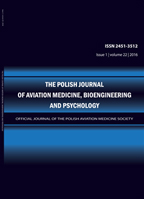2018, Volume 24, Issue 4
INFLUENCE OF SELECTED PHARMACOLOGICAL AGENTS ON THE PSYCHOPHYSICAL EFFICIENCY OF A HUMAN IN CONDITIONS OF THE EXTENDED ALERT PERIOD IN ASSOCIATION WITH THE HYPOXIA STIMULUS AT HIGH ALTITUDE
Anna PRZEWODZKA1, Anna CZERWIŃSKA1, Joanna ŁASZCZYŃSKA1
-------------------------------------------------------------------------------------------------
1Military Institute of Aviation Medicine
Autor korenspondencyjny: Anna PRZEWODZKA; Military Institute of Aviation Medicine; email: aprzewo2@wiml.waw.pl
Full text
Streszczenie
Introduction: The study was conducted to determine the effect of pharmacological agents - Vigil, Nivalin - on the psychophysical efficiency of a pilot in conditions of extended alert period in association with high altitude hypoxia stimulus.
Methods: The experimental group consisted of 13 men who were not acclimated to high altitudes. Within 24 hours before the experiment, the participants maintained a specific activity, which together with a unit study lasted 32 hours. The next day after receiving a single dose of the drug or placebo the men were exposed to simulated hypoxia conditions of 5000 m a.s.l. in a low pressure chamber. During the examination body temperature, heart rate, energy expenditure, sweat loss were controlled and subjective evaluation of the state of thermal comfort, the degree of nuisance of work and mood level were made.
Results: The longest time of hypoxia tolerance was recorded after administration of Vigil (Vigil t=523±128sec, Nivalin t=443±200sec, placebo t=241±225sec). The percentage of people using an oxygen equipment was significantly lower after administration of psychostimulants (Vigil=33%, Nivalin=42%, placebo=75%). As a result of taking pharmacological agents, more favorable increases in core body temperature, energy expenditure and heart rate were recorded. Individuals receiving Vigil and Nivalin perceived the environment as more comfortable and indicated a significantly lower degree of nuisance of work in comparison with the control group. The level of mood (emotional tension) was more favorable after administering Vigil (∆PN=-14.58±6.66) and Nivalin (∆PN=-13.00±9.25) than placebo (∆PN=-11.41±9.82).
Conclusions: Vigil and Nivalin had a beneficial effect on human psychophysical efficiency (improvement of physiological parameters) during a prolonged period of alertness in combination with the stimulus of hypoxia. The medicines increased the body's tolerance to oxygen deficiency, significantly extending the time of exposure to hypoxia. Both substances (especially Vigil) improved subjective feelings of thermal comfort and the degree of nuisance of work and did not result in deterioration of mood.
Słowa kluczowe
Vigil, Nivalin, psychoactive agents, nervous stimulats, high altitude hypoxia, thermal comfort, fatigue, workload
